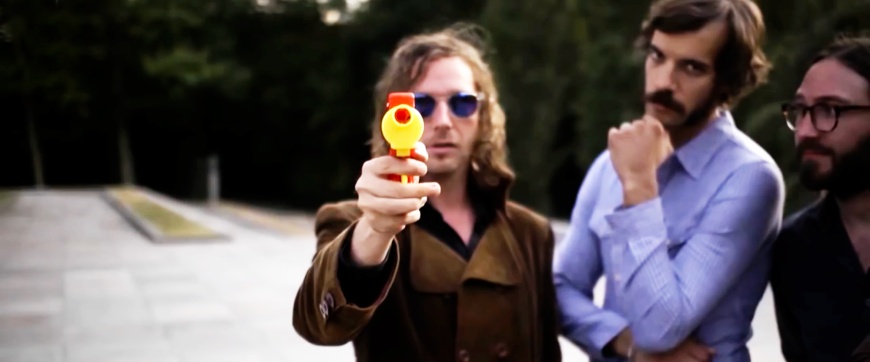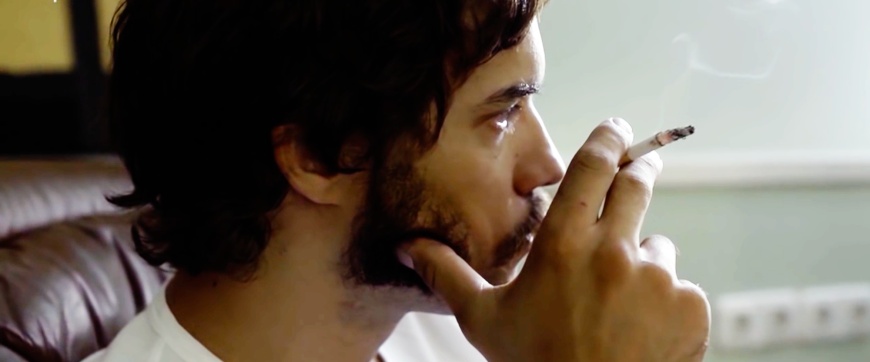Interview with the Directors
Interview with Christian von Brockhausen and Timo Großpietsch (February 2017)
How did you come to make a music documentary?
Christian von Brockhausen: Timo and I were sitting in my apartment. I had just moved in, there was not much in it yet. A refrigerator, a sofa and this "Union-Youth" poster on the wall. Four pimply guys, a rock band. The poster is a relic from my youth: Bad Bentheim, in the middle of Lower Saxony, full of garage grunge, beautiful cow pastures and canned beer. That's how I remember puberty. A band that dreams its way out into the world with its music – as it happens a thousand times. Only with the difference that the story behind the poster and "Union Youth" is a very wondrous one. Almost a kind of fairy tale, which was still told in our area years later. With quite a lot of gaps, rumours and in addition poetry anecdotes. I told Timo about it. And I told him that I never really understood why this story went so crazy. Timo became curious. He asked me many questions to which I had no answers. Then we decided to find those answers. Anyway, we wanted to try. That this really becomes a movie – I never thought it was possible.
Timo Großpietsch: The practical thing was that Christian's best buddy Michael sat at the drums of the band. The two must have talked about the story for years – and still there were dark spots. I suggested to ask Michael if it wouldn't be possible to make a film out of it. The story of a North German dream. We met the drummer in an Indian restaurant on St. Pauli. Well, we ate incredibly spicy stuff, then I asked Michael if we could film his youth. He had a coughing fit. Ten days later we met a part of the old band in Berlin. Why they wanted to meet us was only clear to us afterwards. Maybe they had unconsciously sensed that there was something to clarify. And then there was no turning back.
Many years ago the boys had a chance that every musician dreams of. How did it come about?
TG: They got themselves a little bit of money back then to record four songs provisionally. And then they burned those songs on a CD and sent it to all the labels they liked. One day the phone rang. A man from L.A. was on the other end of the phone. And no less a guy than from the label of Limp Bizkit frontman Fred Durst. Michael answered the phone at that time and thought it was a prank phone call. But the American was serious. He wanted to see the band, they should play for him immediately in the legendary Viper Room on Sunset Strip. Something like that happens to you, I think, only once in a lifetime. Four village boys fly into the big wide world without ever having played a real concert before. The chance of a lifetime.
Already at the beginning of the film there is a very intense friendship scene. How do you shoot such a situation?
CvB: We had arranged to meet for a test shoot and went to Berlin for a weekend. Result open. Most of the time we sat in a smoky rehearsal room with leaky headphones and listened to the noise. But it went well between us all. The many hours we spent together made the trust grow. Michi and I knew each other since kindergarten. That makes it easier in some respects, but sometimes also much harder. The singer, Maze, was for me at that time still a character from countless stories. I thought I knew him, but in truth he was a mystery to me. Maze just disappeared from our town. Michael was often worried, we often talked about it in the evenings on his sofa. Many years before the film. That was an intense experience for me, too: not only being allowed to film there, but also the role change of Michael and me. And then also getting to know Maze. His great voice, the aura, the abysses.
TG: Then on Sunday it happened. Maze didn't come to rehearsal. The band got a call that this time it was serious. He had overdosed. Christian and I stood in the rehearsal room with our cameras and felt completely out of place. It was clear to us that we would pack up our stuff now. The shoot failed. But to our surprise the band decided: "You stay here!". Shortly afterwards, Maze somehow dragged himself to the rehearsal room. We agreed that we could shoot the interview – provided that the group had a veto for this situation. The result was a pretty poignant scene: it shows a desperate attempt to save one's buddy from himself. This was the beginning of a long roller-coaster ride. I remember when Christian, Michael and I went back to Hamburg by car. After an incredibly exhausting Sunday. "There's nowhere to go," said Michael. And we didn't want that at all.
It has also become a film about friendship, a film about your generation. Were you aware of this when you were shooting?
TG: We were not aware of this at the beginning. We grew up with films like "Absolute Giants" or "Village Punks". Films about youth, about the pressing call of the big wide world, about the errant dreams we all carry within us. "We Were Kings" tells what happened to these dreams. And whether the wounds of the past are closing in the boys. Here we have to thank our great commissioning editor Barbara Denz, who has always stood by us. She always saw it as great material, even in the phases in which we had lost track. And we can really seem helpless there! The film took so many twists and turns and was often on the edge. Without Barbara we wouldn't have made it.
Why on the fence?
CvB: To accompany Maze so intimately during a drug withdrawal, telling his private life, illuminating the youth of his best friend – that's all a fine line. Of course such a project crosses the line between the professional and the private. Michael and I also had a big fight once. Sometimes it needed not only the support of Timo and Barbara but also that of my partner to solve conflicts. That was teamwork, really, on all levels.
TG: I remember Christian once called me at night and said: "Now everything is fucked." He and Michael had a big fight. But we quickly got it back on track. Filmmaking has a lot to do with collecting and taking things away. You take moments from other people's lives. And the filmmaker never knows exactly what they recorded. Such filming has a lot to do with mutual trust. And it is a give and take.
You have shot a lot more material than is in the film. How do you decide what is important – and what is not – in a documentary film?
TG: For example, we didn't know for a long time how the film was going to end. Do we have to wait for the release of the record, should we end with the first big tour or is the first small support tour enough? We did not know. The result was that we actually wasted half a year of shooting. But that's the way it is, we weren't making a feature film.
CvB: It's also great fun to call everyone then: "Hi, thanks for letting us film for another six months. We were wrong, unfortunately it was all for nothing. Best regards, your film team'.
TG: We now end with the first support tour. A little road movie of our own in the film.
CvB: For example, we didn't need a big Hurricane concert anymore. Because on average our commissioning editor Barbara Denz felt that it's not about the band career at all. So not exclusively. It's that a big ending for the film is hidden somewhere else: namely in Maze's development. Whether he makes it or not.
Now you're showing your film at the Berlinale. What does that mean for you?
TG: For us a it's dream comes true and we are totally grateful. It was simply also an incredible collaboration with Christian. We complement each other and work together almost symbiotically. We both have our own handwriting, which doesn't get in the way, but creates a new whole. This is wonderful and I am looking forward to new, joint projects.
CvB: It's incredibly beautiful how a circle closes for us. Our story started in Berlin. Without glamour, in a freezing cold smoke-filled recording studio, when these guys were really on the brink of the abyss. And now we are taking a group photo at Potsdamer Platz – unbelievable! The film tells about small and big dreams. Some become blurred and disappear at some point, some grow up with you, others chase you. For us as filmmakers the Berlinale has always been such a dream. One that you almost don't dare to dream. And to experience this with Timo is for me the most beautiful thing.





